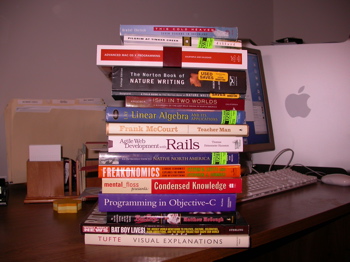January 31, 2006
On friendship
I guess i'm not the only person who has spent time recently thinking about friendships. Dave Winer wrote an essay on the topic and several people have added to the discussion in the comments.
I actually had to "break up" with a friend this week. It seems so odd to use the term "break up," but i'm unfamiliar with a corresponding term for non-romantic relationships. Do people just assume that friendships last forever? It seems rude to just let them awkwardly dissolve into the past. Do most people not care enough to admit to the other person that they are not committed to keeping the relationship healthy?
I wonder if the definition of friend is changing. I think that people use the term too casually. When i poke around sites like Facebook, i see people with 500 confirmed friends. Is it mentally possible to care for that many people at once? Are social networking sites altering our concepts of personal relationships off-line as well?
Pardon my incomplete thoughts. Perhaps i can find the time to properly research this topic at some point.
January 27, 2006
Learning lines
The scariest part about being in a show for me was learning my lines. I was always surprised when i finally got them all in my head. I never gave much thought to how exactly i memorized them but apparently a group of psychologists was curious about just that. They conducted a study that shows good actors (myself not included) use active experiencing. By understanding what the character is trying to do, it's easier to remember what words they might use to do that.
I think of learning a programming language in much the same way as learning the lines of a play. The more you understand about what the language is trying to do and its overall philosophy, the more easily the correct syntax will just roll off your fingers. It is possible to just memorize keywords, but if you understand where they fit in the big picture, you're better able to predict how to do something you've never done before.
January 08, 2006
Let the reading begin

Thanks to the season of gift-giving and the start of a new semester, i have another unusually large stack of books to get through. From the bottom up, they are Visual Explanations by Edward Tufte; Bat Boy Lives by David Perel; Bat Boy (My True Life Adventures Coming of Age with the New York Yankees) by Matthew McGough; Programming in Objective-C by Stehpen Kochan; Condensed Knowledge by Will Pearson; Freakonomics by Steven Levitt and Stehpen Dubner; An Introduction to Native North America* by Mark Sytton; Agile Web Development with Rails by Dave Thomas et al.; Teacher Man by Frank McCourt; Linear Algebra and Its Applications* by David Lay; Ishi in Two Worlds* by Theodora Kroeber; The Norton Book of Nature Writing* (along with the corresponding field guide) by Robert Finch; Advanced Mac OS X Programming by Mark Dalrymple and Aaron Hillegass; Pilgrim at Tinker Creek* by Annie Dillard; and This Cold Heaven* by Gretel Ehrlich.
I currently have bookmarks moving their way through Freakonomics, the Obj-C book, and the Rails book. I was able to find almost all of my school books (those marked with an asterisk) with used stickers on the outside but with seemingly untouched pages on the inside which is good news for the wallet. Finally, i'll divert any questions about the bat boy books to my friend Katie. She has an amusing story as to how those became my Christmas gifts.
January 04, 2006
Ten second nachos
These kids decided to celebrate the new year by making a short film documenting their attempts to make nachos in the Magic Bullet. The results are quite amusing because, of course, it's never as easy as the infomercial makes it look.
January 03, 2006
The life of zero
Over break, i finished a book called Zero: The Biography of a Dangerous Idea. In it, the author documents the changes in human thought as man struggles to understand the significance of such a seemingly simple number as zero. The book begins before ancient civilizations ever created a symbol for the number zero and ends up showing how zero is responsible for the popularity of string theory as a means of describing the universe. Along the way, we meet many philosophers, mathematicians, and physists. Though there is some math mixed in, one of the main themes is the reluctance of the majority to accept radical new ideas even when those ideas turn out to be the truth. The number zero is used as a metaphor to represent both nothingness and the infinite. It's interesting to see how these two concepts shape our understanding of the cosmos. I never would have guessed the biography of a number could be so interesting. I wonder if the life of three is interesting enough to deserve one.
January 02, 2006
Time's up
This vacation i managed to clean the apartment, do some reading, make a meal in my new crock pot, rent some DVDs, go bowling, donate blood, play Mario Party, blow out a tire, go rock climbing, help finish two puzzles, bake some mini-cheesecakes, and toast the new year. Tomorrow i remember what it's like to wake up to the sound of the alarm.